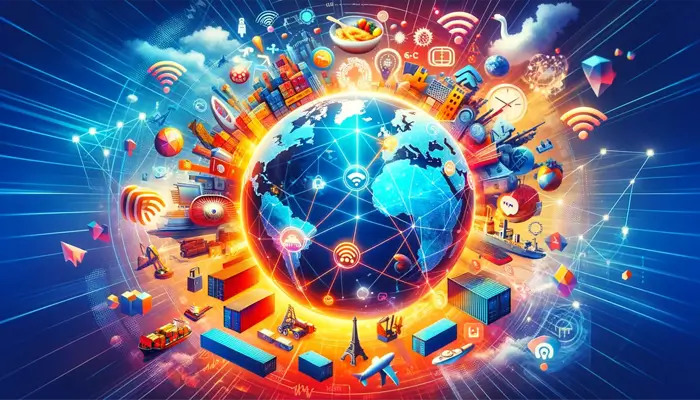The Effects of Globalization on Emerging Economies
Anúncios
The impact of globalization, on the development of emerging countries has been profound. With the movement of goods, finance and people across borders these nations have become part of the market offering both opportunities and challenges. The growth patterns observed in these countries shed light on the effects of globalization.
For example India has seen growth rates while Brazil and Russia have faced downturns. These variations illustrate the consequences of globalization on countries economies. Emerging markets have benefitted from investments and technology transfers that typically accompany globalization. The opening up of markets has fueled expansion creating employment opportunities and driving innovation ultimately raising living standards.
Anúncios
Nevertheless these economies are susceptible to market fluctuations and reliant on investments, which can lead to instability and social disparities. Changes, in trade connections and migration patterns have transformed production and labor markets underscoring the importance of strategies and institutional reforms to effectively manage the impacts of globalization.
Overview of Globalization
The concept of globalization signifies the interconnectedness of economies and societies. This idea has evolved over years, driven by advancements, in technology, transportation and communication. Historically globalization can be traced back to trade paths like the Silk Road, which enabled the exchange of goods, ideas and cultures across lands.
Anúncios

In todays world globalization has rapidly progressed due to advancements in transportation, communication technology and the widespread use of the internet. This interconnected nature has resulted in increased trade activities, cultural interactions and the merging of markets that have significantly influenced the global scenario. To grasp its impacts, on economies, societies and individuals globally it is crucial to understand the progression and core principles of globalization.
Historical Context
The origins of globalization can be linked to the growth of trade routes like the Silk Road, that facilitated the sharing of products and customs. The Age of Exploration hastened international. Colonialism setting the foundation, for the interconnected economies we see today. Yet it was the period following World War II that saw a surge in trade driven by progress in technology and communication as well, as the opening up of markets.
Defining Key Terms
Globalization refers to the phenomenon where businesses, economies and cultures have expanded globally resulting in interconnectedness and interdependence. Emerging economies are countries whose economies are evolving to become more advanced, through growth and industrial development.
Economic Impacts
The impact of globalization, on emerging economies is varied and significant reshaping their structures and trajectories. One key effect is the increase in trade, which allows these economies to better integrate into the market through exports and imports. This boost in trade not drives growth but also exposes them to international competition encouraging innovation and efficiency. Additionally globalization attracts investment to emerging markets bringing in capital and promoting development across sectors. Foreign direct investment not provides resources but also brings expertise, technology and management skills that speed up industrialization and modernization processes.

Furthermore globalization facilitates the transfer of technology and knowledge helping emerging economies bypass stages of development. By gaining access to technologies and best practices these economies can enhance productivity upgrade infrastructure and promote growth through innovation. Moreover globalization encourages interconnectedness and collaboration among countries by fostering the exchange of ideas, research findings and development projects. Overall the various effects of globalization contribute to the evolution of emerging economies by positioning them for growth, on a global scale.
Trade Expansion
Growing economies, in developing countries have seen a rise in trading levels. This growth is driven by the lowering of trade restrictions and enhancements in supply chains. To illustrate trade connections allow these nations to reach markets for their products and services frequently resulting in a trade balance.
- Rising Exports: Products and services from emerging markets are reaching customers, around the world;
- Diverse Imports: Being able to access a range of products that might not be available locally.
Foreign Investment
As globalization becomes more pronounced emerging markets attract Foreign Direct Investment (FDI) to support their development needs.
- Impacts of Capital Inflows: Facilitates the emergence of industries and growth, within ones;
- Job Opportunities: Generation of employment opportunities, from the inception of businesses and the expansion of existing ones.
Technology Transfer
With globalization, there is a facilitated transfer of technology and knowledge from developed to emerging economies.
- Enhanced Productivity: Adoption of new technologies leads to more efficient production methods.
- Innovation Growth: Exposure to diverse technologies can foster domestic innovation.
Social and Cultural Influence
The way globalization has changed things, in emerging economies is quite noticeable with a mix of traditions and global trends becoming more common. You can see this fusion of cultures in life from the food we eat to the clothes we wear the entertainment we enjoy and even the way we speak. As people in emerging economies become more connected globally they get exposed to practices, ideas and ways of living from all over the world.

This exposure adds richness to our customs. Encourages a broader perspective among us all. Globalization has also made it easier for knowledge and values to flow across borders making cultural diversity and acceptance more prevalent in emerging economies. However there are discussions about how to preserve practices amid the growing influence of global norms. In essence globalization has created an interaction between traditions and worldwide cultures, in emerging economies reshaping our societal norms and promoting a more interconnected world.
Cultural Exchange
In emerging economies, the influx of international products, media, and information technology has led to a cultural exchange that often blends local customs with foreign elements. For example:
- Music and Entertainment: Local music styles may adopt influences from global genres, creating fusion music that appeals to a wider audience.
- Cuisine: There’s an increased availability of international food options, which sometimes results in hybrid dishes combining traditional recipes with foreign techniques or ingredients.
Social Structures
The social fabric of emerging economies has experienced shifts due to globalization:
- Education: Curricula may integrate global perspectives, oftentimes emphasizing the English language and Western pedagogies.
- Family and Community: Values and expectations evolve as global norms and role models become accessible through media, often leading to changes in family dynamics and intergenerational relationships.
Political and Legal Ramifications
The infusion of globalization into emerging economies brings about complex political and legal consequences, encompassing shifts in sovereignty and regulatory measures that can either facilitate or impede global integration. As emerging economies become increasingly integrated into the global economy, they often cede some degree of sovereignty to international institutions and agreements governing trade, finance, and investment.

This relinquishment of sovereignty can lead to tensions between national governments and supranational entities, as policymakers balance the imperatives of economic growth with concerns over national autonomy and control. Furthermore, regulatory measures play a crucial role in shaping the extent and nature of global integration within emerging economies.
While some regulations may be designed to attract foreign investment and promote economic development, others may seek to safeguard national interests or protect local industries from external competition. Consequently, navigating the intricate nexus of political and legal dynamics in the context of globalization requires careful consideration of both domestic imperatives and global realities.
Sovereignty Issues
Globalization challenges the traditional notion of sovereignty as it opens economies to foreign influence and international agreements. Countries may cede aspects of sovereign control in favor of multinational treaties and global governance frameworks. For example, in trade agreements, nations often agree to align their domestic policies with international standards, which might limit their policy-making autonomy in certain sectors.
Regulatory Changes
The alignment with global norms necessitates comprehensive regulatory changes within emerging economies. Legal frameworks are often overhauled to meet international best practices, which can lead to:
- Enhanced protection of intellectual property rights, aligning with global standards to attract foreign investment.
- Reform of competition laws to ensure fair play in an increasingly interconnected marketplace.
- Introduction of data protection regulations that safeguard the privacy of citizens while complying with cross-border data flow agreements.





